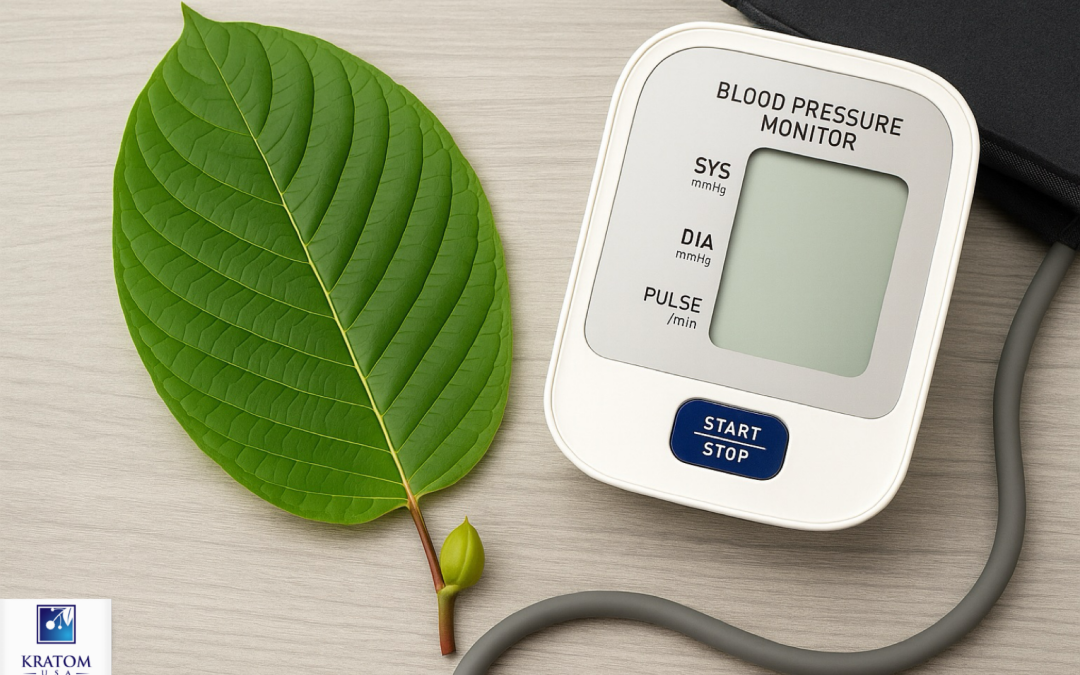❤️ Kratom and Blood Pressure: What You Need to Know
Can Kratom Raise or Lower Your Blood Pressure? A Science-Based Look
Kratom (Mitragyna speciosa), a tropical herb native to Southeast Asia, is increasingly used for pain relief, energy, anxiety, and natural wellness. But for those with cardiovascular conditions or concerns about hypertension, a common question arises:
👉 Can kratom affect blood pressure?
In this article, we’ll explore how kratom interacts with the body’s cardiovascular system, what studies say about kratom’s effects on blood pressure, and how to use it safely—especially if you have pre-existing heart conditions or hypertension.
📌 Key Points: Kratom and Blood Pressure
-
🧪 Kratom’s alkaloids can influence blood pressure, heart rate, and vascular tone
-
⬆️ High doses may cause temporary increases in blood pressure or heart palpitations
-
⬇️ Low-to-moderate doses may relax blood vessels, especially with red strains
-
💊 Certain medications may interact with kratom’s cardiovascular effects
-
✅ Always consult a healthcare provider before using kratom if you have high blood pressure or heart issues
🧬 How Kratom Works in the Body
Kratom leaves contain over 40 bioactive alkaloids, the most studied being:
-
Mitragynine – Acts as a partial agonist on mu-opioid receptors, contributing to analgesia and sedation
-
7-Hydroxymitragynine – Potent pain reliever and central nervous system depressant
-
Speciogynine, Paynantheine, and Corynantheidine – May influence smooth muscle relaxation, which includes vascular muscles
These compounds not only affect mood and pain, but also interact with the autonomic nervous system, which regulates blood pressure, heart rate, and vascular constriction.
🔍 What Does the Research Say?
There is limited but growing research on kratom’s cardiovascular effects. Key findings include:
🩺 Mild Elevation in Blood Pressure and Heart Rate
-
A 2018 study published in Clinical Toxicology found that high doses of kratom may elevate blood pressure and heart rate, especially in stimulant-like strains or extracts
-
This is likely due to kratom’s action on adrenergic receptors, which are the same receptors activated by stimulants like caffeine and ephedrine
😌 Relaxation and Vasodilation at Low Doses
-
Anecdotal reports and animal studies suggest that red vein strains, which are higher in speciogynine, may relax smooth muscle, potentially supporting mild blood pressure reduction in some users
-
However, this effect is not consistent or predictable enough for kratom to be considered a treatment for hypertension
📖 Case Reports & Clinical Surveys
-
In a 2019 report in the Journal of Psychoactive Drugs, most kratom users did not experience dangerous cardiovascular side effects at typical doses (2–5 grams)
-
That said, individual responses vary widely, and risks may increase with pre-existing conditions or poly-drug use
⚠️ Kratom and Hypertension: Who Should Be Cautious?
Kratom’s potential to raise or lower blood pressure depends on:
-
Dose – Higher doses more likely to raise blood pressure
-
Strain – White strains may stimulate the nervous system; red strains may relax it
-
Individual factors – Existing heart disease, medications, hydration levels, etc.
❌ Avoid kratom or proceed with caution if you:
-
Have uncontrolled hypertension
-
Use beta-blockers, ACE inhibitors, or diuretics
-
Have a history of arrhythmias or stroke
-
Use stimulants, caffeine, or other vasoconstrictors
🌿 Best Kratom Strains for Blood Pressure Sensitivity
If you’re curious about trying kratom but want to avoid blood pressure spikes, these strains are typically considered milder and more relaxing:
| Strain | Effects | Blood Pressure Consideration |
|---|---|---|
| Red Bali | Relaxation, mild sedation | May promote vasodilation |
| Red Borneo | Pain relief, calming | Often used for stress reduction |
| Green Malay | Balanced energy/mood | Milder cardiovascular effects |
| Avoid: White Maeng Da, White Thai | Stimulant-like; may elevate BP |
🧪 Safe Use Guidelines for Blood Pressure Management
✅ General Tips
-
Start with a low dose (1–2 grams)
-
Avoid extracts or enhanced kratom
-
Stay hydrated—dehydration can raise blood pressure
-
Never combine kratom with caffeine, nicotine, or stimulants
-
Monitor your blood pressure regularly if you’re sensitive
🕒 Dosage Chart
| Dose | Effect | Risk for BP |
|---|---|---|
| 1–2g | Focus, mild mood lift | Low |
| 2.5–4g | Moderate pain relief, relaxation | Medium |
| 5g+ | Sedation, potential dizziness or elevated heart rate | Higher risk |
🤔 FAQ: Kratom and Blood Pressure
❓ Can kratom lower blood pressure?
Possibly at low doses with sedating strains, but it’s not reliable or consistent enough to be used for hypertension.
❓ Can kratom raise blood pressure?
Yes—especially at high doses or with white vein strains. Effects vary person to person.
❓ What are the symptoms of kratom-related blood pressure issues?
-
Headache
-
Dizziness
-
Heart palpitations
-
Sweating
-
Chest tightness (seek medical help immediately if this occurs)
❓ Is it safe to take kratom with blood pressure medication?
No. Kratom may interact with medications like beta-blockers, calcium channel blockers, or diuretics. Always talk to your doctor first.
❓ Should I take kratom if I have high blood pressure?
Not without medical approval. While some users report no issues, the risks are not well understood, and kratom can be unpredictable in sensitive individuals.
❤️ Final Thoughts: Kratom and Cardiovascular Health
Kratom can impact blood pressure through its effects on the nervous system and blood vessels. While some users experience relaxation and vasodilation, others—especially at higher doses—may notice increased heart rate or elevated blood pressure.
If you have any cardiovascular concerns, it’s essential to approach kratom with caution, start low, and consult your physician before use.
📦 Looking for lab-tested, red vein kratom strains with a mild cardiovascular profile?
Visit KratomUSA.com to explore natural options designed for pain relief and relaxation—without added stimulants.


